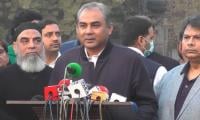COVID-19, the deadly pandemic, is moving at a fast pace, killing thousands of people worldwide in its wake every day. The confirmed cases of coronavirus have topped 3.4 million worldwide while over 240,000 people are known to have died from the virus. More than one million have recovered. The world’s economy and people have been deeply affected as some regions continue to bear the brunt of the epidemic.
There have been fewer deaths in Pakistan due to Covid-19 and lesser number of cases as had been previously modeled. But that does not mean we should become relaxed in our efforts to safeguard against the disease. Experts have identified some more steps that should be taken at the national level.
The federal and provincial governments must maintain a sturdy supply of critical medical equipment/PPEs and implement frequent testing mechanism for front-line healthcare staff.
The NDMA should ensure early procurement/ delivery of ordered medical supplies for capacity building of healthcare sector.Accurate forecasting of critical medical supplies must be urgently ensured based on real time/authentic data.
The federal/provincial governments must formulate policy guidelines for technical/ forensic analysis of foreign donated monitoring/ surveillance devices.
Observance of strict social distancing protocol during disbursement of amount through Ehsaas Programme, provision of ration in Bazaars during shopping should be ensured.
Government should negate general perception of mismanagement/ mistreatment at quarantine centres through implementation of strict regulatory mechanism to dispel fears in populace.
The provincial governments must provide minimum one month ration to vulnerable/ missed-out communities such as living in far-flung areas by inclusion of philanthropist and charity organizations through a well-defined and coordinated mechanism.Strict implementation of burial protocols and training of burial workers should be ensured.
Federal government must carry out immediate necessary policy interventions in banking sector, fiscal matters and public finances, social safety nets, SMEs and large businesses, commodity prices, public health challenges and role of private sector and NGOs.
Price control mechanism may be strictly regulated by the state machinery during Ramazan.Food security challenges must be mitigated through availability of essential agri-support infrastructure, provision of required inputs.
The agriculture sector should be provided facilities and incentives to cultivate essential items so that Pakistan should not import pulses and edible oils, etc.The federal government needs to galvanize diplomatic missions, lobbying with the host countries to treat Pak workers generously and minimise the chances of being laid-off.
Moreover, policy-level decisions should be implemented on priority to have visible dividends. Disjointed efforts may lead to paralysis at execution level. Flexible policy for gradual opening of industrial/ business sector should be ensured in synchronization with the four provinces.
Due to breakdown, power was cut off in Mall Road, Jhikagali, Bhurban, Expressway and other areas
Demonstrators criticise introduction of a token system at the Kuntani border
He says bunkers would be demolished and weapons collected to restore peace to the area
Special Judge Central Shahrukh Arjumand conducts hearing at Adiala Jail on Friday
PN flotilla was led by Commander 14th Destroyer Squadron, Commodore Muhammad Umair
ATC Special Judge Amjad Ali Shah approves her bail until January 13







